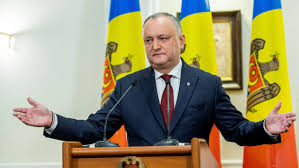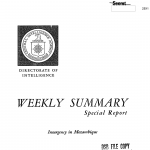On the eve of the Moldovan presidency elections scheduled for November 1, Russia launches a campaign accusing the United States of planning a revolution to overthrow the regime in Chisinau.
This scenario was announced by the Russian Foreign Intelligence Service head, Sergey Naryshkin. The statement shortly followed after RISE Moldova journalists and the Dossier group had published documents allegedly given by the secretariat of the Russian Foreign Intelligence Service General Vladimir Chernov, the head of the presidential department for interregional and cultural relations with foreign countries. These documents indicate that the President of Moldova, Igor Dodon, has been calling Moscow and sending his speech texts for approval for a long time. Thus, this proves that the President of Moldova and his inner circle are strongly influenced by the Kremlin, especially, in terms of Chisinau’s foreign policy steps.
The published information shows that Dodon keeps in touch with the ex-Deputy Director of the Foreign Intelligence Service Yuri Zubakov who worked as the Russian Ambassador to Moldova in 2003-2004; the Foreign Intelligence Service officer, Sergei Skripnikov, and Deputy General Chernov, the chief curator of Moldova from the Foreign Intelligence Service, Igor Maslov.
Thus, the mentioned materials claim that the Russian Foreign Intelligence Service runs Igor Dodon’s campaign headquarters.
In September of this year, the same authors, the Dossier group, associated with the Main Intelligence Directorate, published a material where Vladimir Chernov was called as the curator of work with pro-Russian forces in Georgia.
Analysis of the documentary evidence published by RISE Moldova and the Dossier Center gives grounds for taking them as authentic. Since Igor Dodon is known for the Kremlin’s backup, his supervision by the Russian Foreign Intelligence Service is airtight and looks quite feasible. For example, after the 2019 parliamentary elections in Moldova when Dodon’s socialists won the most seats in the Legislative Assembly, the deputy head of the presidential administration of the Russian Federation, Dmitry Kozak, a member of the Foreign Intelligence Service/Federal Security Service, arrived in Chisinau. In early 2000, he was Moscow’s responsible figure for the developing scenarios to maintain Russia’s influence in Transnistria.
The discrediting of Dodon is likely the result of a confrontation between the groups controlling the Foreign Intelligence Service/Federal Security Service and the Ministry of Defense/Main Intelligence Directorate.
In their activity heads of Russian government departments are motivated by the level of budget funds control and influence on the country’s leader to ensure the access to the funds and powers rather than by the state interests.
This system has been formed since Soviet times and is especially rooted strong enough among the so-called siloviki, heads of ministries and departments responsible for security and defense. In such a system of power, the state leader plays the role of a moderator between all these groups in order to find and ensure a balance. However, competition in this system happens to be, however, it should not turn into open conflict; otherwise, it threatens the security and stability of the functioning of the entire state system.
Therefore, the published documents can be targeted at undermining the Lubyanka’s positions not only in Moldova, but also in Moscow in the context of attempts to neutralize the influence of the Secretary of the Security Council Nikolai Patrushev, as well as Dmitry Kozak, the deputy head of the Putin Administration who is responsible for the post-Soviet space politics.
According to our estimates, the intensification of information campaigns of the two Russian intelligence agencies directed against each other is related to the budgetary process in Russia and plans of the Ministry of Finance to downsize Russia’s armed forces by 100,000. The leadership of the Ministry of Finance is the part of the Kremlin’s influence group controlling the Foreign Intelligence Service/Federal Security Service.
As the result, the Defense Ministry group is likely to discredit its competitors in the struggle for the state budget allocation just before the 2021 budget parliamentary voting. In this case, the published documents are sourced on SIGINT, the data intercepted by means of technical intelligence, that is, cyber espionage performed by hackers from ‘Rota Tower’ (seat of the Main Intelligence Directorate unit 74455).
In addition, the group controlling the Ministry of Defense and military intelligence is using to the full dismissal of the first deputy of this department, Sergey Smirnov, who has held the position since 2003 and was responsible for the military counterintelligence department. It means that it was him who could put pressure on the people of Defense Minister Sergei Shoigu and have access to the processes taken place in the defense department. A serious struggle has already started around the appointment of Smirnov’s successor.
Smirnov’s dismissal may be related to the arrest of armed raiders robbing the little-known Metallurg Bank in July last year; the bank owner is Yuri Karasev, the Main Intelligence Directorate former operative. There is a high probability that the bank served the Russian military intelligence. Smirnov’s grandson, who worked for the Federal Security Service anti-corruption department, was arrested on charges of bank attack.
In this regard, it is logical to assume that the operation may stem from the fact that the group behind the military intelligence has its own candidate among those who are running for the Moldovan presidency. One of the candidates, Renato Usatii, the leader of the Our Party formation, is a pro-Russian politician, and his background allows us to believe on reasonable grounds that he is associated with the Main Intelligence Directorate. However, his chances are minimal. He can defeat Dodon only in the second round but for this he needs votes from the right that is impossible. It follows that the Main Intelligence Directorate will be probably interested in the victory of another presidency candidate, or in the destabilization of the situation in the country following accusations of voting results falsification on the analogy with Belarus.
The least likely scenario is an attempt of the Foreign Intelligence Service itself to discredit Dodon in order to replace him with a more squeezable and decisive figure. In this case, the source of the published documents is their recipient at the Foreign Intelligence Service office.




